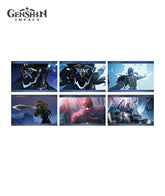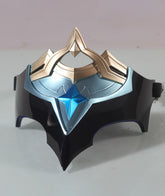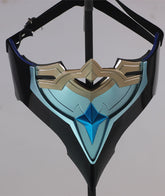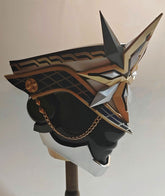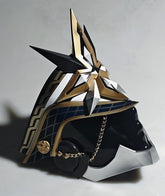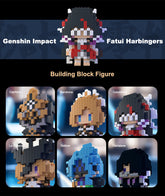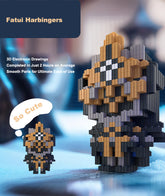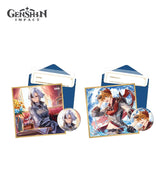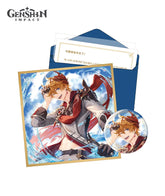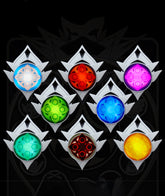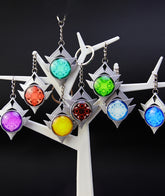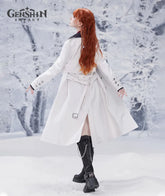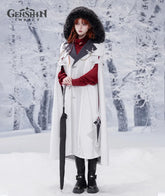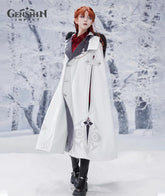Genshin Impact Fatui Analysis: Harbingers' Name Origins and Realistic Inspirations
As is well known, miHoYo puts great care into naming its characters. The names of the Fatui Harbingers are not randomly invented but originate from the 11 stock characters in Italian Commedia dell'arte. This article brings you the secrets behind the names of the eleven Fatui Harbingers.

Italian Commedia dell'arte can be traced back to the 16th century. This form of theater is characterized by a set of stock roles, each with relatively fixed names, personalities, and social statuses. Actors wore masks, portrayed these stock characters, and performed plays using improvised lines. These roles include The Jester, totaling eleven in all. This article will introduce each of the Fatui Harbingers shown in the image, helping you gain a deeper understanding. Travelers who like them can also check out the related Genshin Fatui Merch, each piece cleverly designed with iconic character elements and full of unique charm.
1. Genshin Impact - "The Jester"

Name: Pierro
The Jester is the Director of the Fatui, the leader of the Eleven Harbingers, and also the first Harbinger. His name Pierro is derived from the French word pierrot. The game uses a variant form of this French word. In French, the ending consonant "t" in pierrot is silent, so Pierro and pierrot are homophones.

In Italian Commedia dell'arte, The Jester corresponds to the character Pedrolino, which is the Italian form of Pierrot. He is the most representative character in Italian comedy, always painting his face in a sorrowful white, representing a sad clown. He is tormented because his wife Colombina's heart was stolen by his rival Arlecchino (The Knave).
2. Genshin Impact - "The Damselette"

Name: Colombina
The name Colombina is derived from a variant of the Italian word colomba (dove), and the design of her four-winged headdress also features elements related to dove wings.

In Italian Commedia dell'arte, there happens to be a character of the same name, Colombina. She represents an unmarried woman of petty bourgeois image or a sharp-tongued maid. This character does not wear a mask, is dressed in beautiful and bright clothes, is full of passion, free-spirited, loves to gossip, and is resourceful. Interestingly, her identity is usually the wife of Pedrolino (The Jester), but she maintains a lover's relationship with Arlecchino (The Knave).
3. Genshin Impact - "The Rooster"

Name: Pulcinella
Pulcinella means "a hunchbacked comical character with a long nose" in Italian. This word is not a variant; it is itself a character from Italian Commedia dell'arte. The root of the word is the Italian pulcino (chick).

In Italian Commedia dell'arte, this character wears a comical long-nosed mask, portraying the master of a wealthy family who will do anything to make money, even resorting to deceit. He will try his best to prevent his daughter from falling in love with a poor boy. Therefore, this character gives people a feeling of being cunning and greedy.
4. Genshin Impact - "Marionette"

Name: Sandrone
Sandrone originally refers to a traditional handmade puppet in Italy, specifically used for theatrical performances, generally portraying a poor peasant image. Initially, this role was played by puppets, but later it was gradually performed by real people.

In Italian Commedia dell'arte, this character has a very low social status, representing a honest servant who is cowardly and easily manipulated, or a whimsically young servant boy. In Genshin Impact, however, the Marionette Sandrone is a Gothic-style little girl sitting on the hand of a giant robot. Whether Sandrone herself is a puppet or not awaits further storyline supplement.
5. Genshin Impact - "The Captain"

Name: Capitano
Capitano is an Italian word meaning "captain, ship captain, or captain in the army," equivalent to the English word "captain."

In Italian Commedia dell'arte, the character corresponding to The Captain is "Il Capitano." "Il" is the definite article in Italian, used before masculine singular nouns. This character likes to boast, brag about his bravery, but always flees at the critical moment. In the comedy, he is usually from Spain and is hired by Pantalone (The Regrator/The Rich) to complete certain tasks.
6. Genshin Impact - "The Balladeer"

Name: Scaramouche
Original Name: Kunikuzushi
Scaramouche originally means a cowardly and boastful clown character in Italian Commedia dell'arte, extended to mean "coward." "The Balladeer" in Chinese can mean both scattered soldiers and mercenaries.

In Italian Commedia dell'arte, Scaramouche usually appears together with The Captain, Il Capitano, and is often a bard who sings praises of Il Capitano. He is also portrayed as a handsome young mercenary, always wearing a long sword at his waist symbolizing his knightly status. He often brags about being brave and skilled in battle, but in reality, he is an incompetent coward.
In the famous song "Bohemian Rhapsody" by Queen, there is a lyric: "Scaramouche, Scaramouche, will you do the Fandango?" and The Balladeer's entrance BGM in the game is titled "Ominous Fandango." In fact, much of The Balladeer's experience heavily references "Bohemian Rhapsody."

The Balladeer's original name "Kunikuzushi" carries the meaning of "country destroyer," originating from a stock character in Japanese Kabuki, meaning "one who attempts to steal a country and manipulate power."
Additionally, "Kunikuzushi" is also an alternative name for cannons in Japanese, first coming from the Sengoku daimyo Ōtomo Sōrin who employed Nanban artillery in warfare. The reason for this name is that the cannon's power is so great it can easily destroy a country. "Kunikuzushi" is the romanization of the Japanese "国崩し".
7. Genshin Impact - "The Fair Lady"

Name: La Signora
Original Name: Rosalyne-Kruzchka Lohefalter
"La" is the definite article used before feminine singular nouns in Italian, equivalent to "the" in English. "Signora" means "lady" in Italian, a feminine noun. In Italian, nouns referring to specific things must be used with the definite article to indicate their gender.
Now, let's look at the original name of The Fair Lady. "Rosalyne" originates from Latin, meaning "beautiful rose." "Kruzchka" comes from the Latin transliteration of a Russian word, meaning "cup." The Fair Lady was originally from Mondstadt, and this middle name was likely given to her by the Tsaritsa of Snezhnaya after she joined the Fatui. In Russian, personal names generally consist of three parts: given name + patronymic + surname. The patronymic is a unique middle name in Russian. With the addition of this middle name bestowed by the Tsaritsa of Snezhnaya, The Fair Lady became fully integrated into Snezhnaya (Russia).
"Lohefalter" originates from German, meaning "blazing flame butterfly." This is a German compound noun, formed by combining two nouns: "Lohe" (blaze/fire) + "Falter" (butterfly).

In Italian Commedia dell'arte, the character Signora is generally the wife of Pantalone (The Regrator/The Rich), older than the Damselette Colombina, dressed in various luxurious outfits, heavily made-up, beautiful, and captivating. It must be said that the game's restoration of Signora's image is highly accurate.
8. Genshin Impact - "The Doctor"

Name: Dottore
"Dottore" means "doctor" (both academic and medical) in Italian. Why is it translated as "The Doctor" in other languages within the game rather than specifically "physician"? It is speculated that this is to highlight his image as a mad scientist.

In Italian Commedia dell'arte, the character corresponding to The Doctor is "Il Dottore," portrayed as a pot-bellied middle-aged man, wearing formal attire, and behaving arrogantly. He is a friend of Pantalone (The Regrator/The Rich) and would help him concoct some medicines. It cannot be denied that this Doctor is quite knowledgeable.
9. Genshin Impact - "The Regrator"

Name: Pantalone
The name Pantalone is taken directly from the character of the same name in Italian Commedia dell'arte, meaning "rich man, wealthy merchant lord." Just look at the jewels worn on this narrow-eyed man's hands to see how wealthy he is!

In Italian Commedia dell'arte, the wealthy merchant Pantalone is a very rich character, married to La Signora (The Fair Lady). The Pantalone in Commedia dell'arte is characterized as a money-grubbing and very lecherous old man. La Signora was noticed by him precisely because of her beauty. He is good friends with Dottore (The Doctor).
10. Genshin Impact - "The Knave"

Name: Arlecchino
Arlecchino in Italian means "a masked clown wearing motley clothing," extended to mean "a person of casual words and actions." Considering Arlecchino's reprimands of Pulcinella (The Rooster) and Pantalone (The Regrator) in the storyline, this dashing young woman hardly seems like a servant. How did she get the title "The Knave"? This must be traced back to her prototype.

In Italian Commedia dell'arte, Arlecchino is characterized as the servant of the wealthy merchant Pantalone, and also the lover of Colombina (The Damselette). He is witty, slick, agile, and kind-hearted, often mercilessly mocking and teasing the rich, including his master Pantalone. While the game modified the characterization of Arlecchino, it retained the plot point of the servant confronting the rich man.
11. Genshin Impact - "Childe"

Name: Tartaglia
Original Name: Ajax
Tartaglia originates from a variant of the present tense of the Italian verb "tartagliare" (to stutter).

In Italian Commedia dell'arte, this character is portrayed as having a stutter and often being mocked by others. However, he is wise yet seemingly foolish-appearing simple but actually very clever. In the game, Childe's title "Childe" has no relation to stuttering. "Childe" in English refers to a young nobleman who has not yet been knighted in medieval times, translated as "young noble."
Yet, while giving Tartaglia a new image, the game still retains some characteristics from the comedy. For example, his unique style. In Commedia dell'arte, Tartaglia is the only character without a fixed identity; he can be a lawyer, doctor, policeman, etc., and his attire also differs from other characters. Similarly, in the game, compared to other Harbingers, Tartaglia's approach is distinctive. For him, using strong-handed methods to solve problems is the way, unlike other Harbingers who rely on strategy.

Now, let's look at Childe's original name. Ajax (Ajax) is taken from the hero of the same name in Greek mythology, symbolizing a powerful warrior. During the Trojan War, Ajax was one of the main generals of the Greek alliance, known for his bravery in battle. Childe's younger brother Teucer (Teucer) also comes from Greek mythology, being one of the finest archers in the Greek alliance. In Homer's epic The Iliad, Ajax and his brother Teucer fought side by side against Troy, but due to the gods' bias and mockery, Ajax was treated unfairly and ultimately drew his sword and took his own life in grief and anger.

In summary, most of the names of the Fatui's Eleven Harbingers originate from Italian, while the three characters with known original names-Scaramouche, La Signora, and Tartaglia-incorporate local characteristic languages into their birth names. In terms of character design, compared to Italian Commedia dell'arte, innovations have been made to varying degrees for all characters except La Signora.
That concludes all the research content about the Fatui Harbingers. After reading it, I believe you must be more interested in their background stories!
















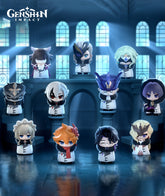
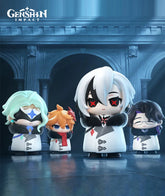
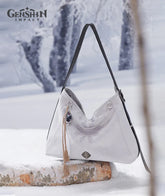

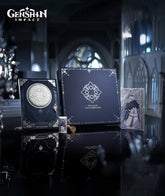
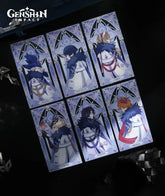

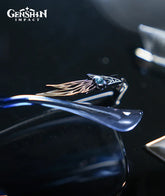
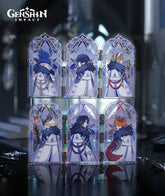
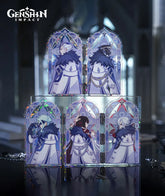
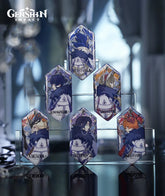
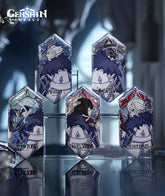

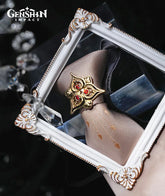
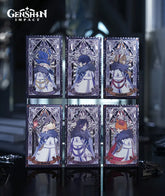
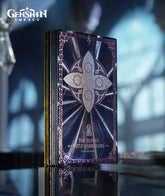
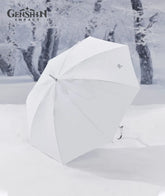
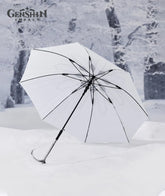
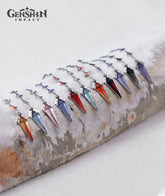
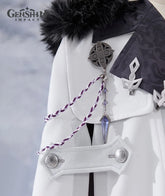
![[Official Merchandise] Genshin Impact Fatui Harbingers A Winter Night's Lazzo Series Merchandise](http://genshinfans.com/cdn/shop/files/15_982830aa-3cd0-4969-b05d-91e3cc1bef2d_165x.jpg?v=1714448874)
![[Official Merchandise] Genshin Impact Fatui Harbingers A Winter Night's Lazzo Series Merchandise](http://genshinfans.com/cdn/shop/files/31_165x.jpg?v=1714448877)

